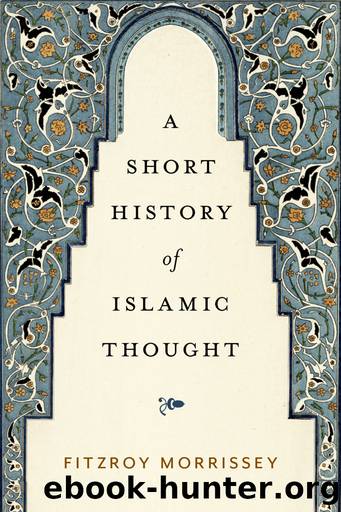A Short History of Islamic Thought by Morrissey Fitzroy;

Author:Morrissey, Fitzroy;
Language: eng
Format: epub
Publisher: Oxford University Press, Incorporated
Published: 2022-11-15T00:00:00+00:00
Chapter Eight
REASON, REVELATION, AND INSPIRATION
If Sufi mysticism was becoming mainstream, then so, too, was philosophical theology. As with Sufism, a key figure in this development was al-Ghazali. As weâve seen, his logical critique of the philosophers played an important role in the development and diffusion of the more philosophical Ashâarism of his teacher al-Juwayni. After al-Ghazali, the next great philosophical theologian was Fakhr al-Din al-Razi (1150â1210).1 Born in Rayy, al-Razi had studied Ashâari theology in Nishapur â reportedly learning one of al-Juwayniâs theological treatises by heart â and philosophy at Maragha in north-western Iran.2 Like many scholars of the time, he was constantly on the move, travelling from city to city in search of patronage and protection from the various ruling dynasties of the Muslim world. Wherever he went, three hundred students reportedly came in tow. Eventually he settled in Herat in modern Afghanistan, where he was given his own madrasa and honoured as the âmaster of Islamâ (shaykh al-islam).3
Much like al-Ghazali, al-Razi had an ambivalent relationship with falsafa. A critical commentator on the works of Ibn Sina as well as a prolific author of original works of Ashâari theology, Shafiâi legal theory, and Qurâanic exegesis, al-Razi identified several fallacies in the theories of the philosophers.4 In his commentary on Ibn Sinaâs Pointers and Reminders, for instance, he criticized the great philosopherâs proofs for the existence and unity of God, his doctrine of emanation, and his view (also criticized by al-Ghazali in the Incoherence) that Allah only knew things âin a universal wayâ.5
Yet, again like al-Ghazali, al-Razi also saw much that was useful and good in philosophy. Conceding that Ibn Sinaâs book contained, as he put it, âimportant points and remarkable insightsâ, he studied and absorbed the philosophersâ logical methods, adopted their tripartite view of the soul, and came to think that the highest form of human happiness lay in attaining intellectual perfection.6 Nor was al-Razi afraid to deviate from earlier Ashâari views, dismissing the classical Ashâari doctrine of kasb â the deterministic notion that humans âacquiredâ their acts from Allah â as âa name indicating nothingâ, and criticizing al-Ghazaliâs arguments against the philosophers and Ismaâilis where he found them wanting.7 He even spoke highly of the freethinking poet al-Maâarri and engaged with the ideas of the heretical philosopher Muhammad ibn Zakariyya al-Razi (their shared name indicates that both hailed from the Iranian city of Rayy), hinting at a more radical rationalism hidden beneath the surface of his writings.8
Just as important as his engagement with philosophical ideas, al-Razi also wrote his works in the way that philosophers did, adopting what the historian Ibn Khallikan called a âsystematical arrangement of topicsâ in his theological treatises.9 A typical al-Razi treatise proceeded step by step through the key topics of philosophical theology, beginning with a section on epistemology and logic, then moving onto questions relating to the nature of existence, then to matters connected to God and the divine realm, and finally to issues arising from revelation, such as the nature of prophecy and the afterlife.
Download
This site does not store any files on its server. We only index and link to content provided by other sites. Please contact the content providers to delete copyright contents if any and email us, we'll remove relevant links or contents immediately.
| Africa | Americas |
| Arctic & Antarctica | Asia |
| Australia & Oceania | Europe |
| Middle East | Russia |
| United States | World |
| Ancient Civilizations | Military |
| Historical Study & Educational Resources |
Never by Ken Follett(2880)
The Man Who Died Twice by Richard Osman(2299)
Machine Learning at Scale with H2O by Gregory Keys | David Whiting(2291)
Fairy Tale by Stephen King(2069)
Will by Will Smith(2041)
Rationality by Steven Pinker(1765)
The Dawn of Everything: A New History of Humanity by David Graeber & David Wengrow(1570)
The Dark Hours by Michael Connelly(1570)
Principles for Dealing With the Changing World Order: Why Nations Succeed and Fail by Ray Dalio(1373)
Friends, Lovers, and the Big Terrible Thing by Matthew Perry(1327)
A Short History of War by Jeremy Black(1300)
HBR's 10 Must Reads 2022 by Harvard Business Review(1256)
Go Tell the Bees That I Am Gone by Diana Gabaldon(1234)
Can't Hurt Me: Master Your Mind and Defy the Odds - Clean Edition by David Goggins(1227)
515945210 by Unknown(1207)
Fear No Evil by James Patterson(1109)
443319537 by Unknown(1072)
Works by Richard Wright(1018)
Going There by Katie Couric(991)
